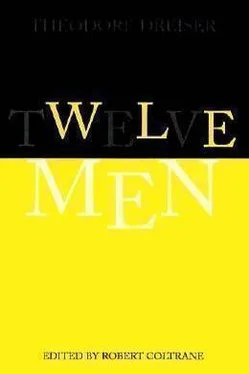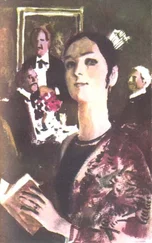Теодор Драйзер - Twelve Men
Здесь есть возможность читать онлайн «Теодор Драйзер - Twelve Men» весь текст электронной книги совершенно бесплатно (целиком полную версию без сокращений). В некоторых случаях можно слушать аудио, скачать через торрент в формате fb2 и присутствует краткое содержание. Год выпуска: 2014, Издательство: epubBooks Classics, Жанр: Биографии и Мемуары, на английском языке. Описание произведения, (предисловие) а так же отзывы посетителей доступны на портале библиотеки ЛибКат.
- Название:Twelve Men
- Автор:
- Издательство:epubBooks Classics
- Жанр:
- Год:2014
- ISBN:нет данных
- Рейтинг книги:4 / 5. Голосов: 1
-
Избранное:Добавить в избранное
- Отзывы:
-
Ваша оценка:
- 80
- 1
- 2
- 3
- 4
- 5
Twelve Men: краткое содержание, описание и аннотация
Предлагаем к чтению аннотацию, описание, краткое содержание или предисловие (зависит от того, что написал сам автор книги «Twelve Men»). Если вы не нашли необходимую информацию о книге — напишите в комментариях, мы постараемся отыскать её.
Twelve Men — читать онлайн бесплатно полную книгу (весь текст) целиком
Ниже представлен текст книги, разбитый по страницам. Система сохранения места последней прочитанной страницы, позволяет с удобством читать онлайн бесплатно книгу «Twelve Men», без необходимости каждый раз заново искать на чём Вы остановились. Поставьте закладку, и сможете в любой момент перейти на страницу, на которой закончили чтение.
Интервал:
Закладка:
"But you might be interested in novels only or plays, or poetry."
"No," he returned after a pause and with that same air of unrelieved condescension, "the short story is what I want to specialize in."
"Well," I said to myself, "here is a young cub who certainly has talent, is crowded with it, and yet owing to the kind of thing he is starting out to do and the fact that life will give him slaps and to spare before he is many years older, he needs to be encouraged. I was like that myself not so long ago. And besides, if I do not encourage this type of work financially (which is the best way of all), who will?"
About a week later I was given another and still more gratifying surprise, for one day, in his usual condescending manner, he brought to me two short pieces of fiction and laid them most gingerly on my desk with scarcely a word—"Here was something I might read if I chose," I believe. The reading of these two stories gave me as much of a start as though I had discovered a fully developed genius. They were so truly new or different in their point of view, so very clear, incisive, brief, with so much point in them ( The Second Motive ; The Right Man ). For by then having been struggling with the short–story problem in other magazine offices before this, I had become not a little pessimistic as to the trend of American short fiction, as well as long—the impossibility of finding any, even supposing it publishable once we had it. My own experience with "Sister Carrie" as well as the fierce opposition or chilling indifference which, as I saw, overtook all those who attempted anything even partially serious in America, was enough to make me believe that the world took anything even slightly approximating the truth as one of the rankest and most criminal offenses possible. One dared not "talk out loud," one dared not report life as it was, as one lived it. And one of the primary warnings I had received from the president of this very organization—a most eager and ambitious and distressing example of that American pseudo–morality which combines a pirate–like acquisitiveness with an inward and absolute conviction of righteousness—was that while he wanted something new in fiction, something more virile and life–like than that "mush," as he characterized it, to be found in the current magazines, still (1), it must have a strong appeal for the general reader (!); and (2), be very compelling in fact and clean , as the dear general reader would of course understand that word—a solid little pair of millstones which would unquestionably end in macerating everything vital out of any good story.
Still I did not despair; something might be done. And though I sighed, I hoped to be able to make my superior stretch a point in favor of the exceptional thing, or, as the slang phrase went, "slip a few over on him," but that of course meant nothing or something, as you choose. My dream was really to find one or many like this youth, or a pungent kind of realism that would be true and yet within such limits as would make it usable. Imagine, then, my satisfaction in finding these two things, tales that I could not only admire genuinely but that I could publish, things that ought to have an interest for all who knew even a little about life. True, they were ironic, cruel, but still with humor and color, so deftly and cleanly told that they were smile–provoking. I called him and said as much, or nearly so—a mistake, as I sometimes think now, for art should be long—and bought them forthwith, hoping, almost against hope, to find many more such like them.
By this time, by the way, and as I should have said before, I had still further enlarged my staff by one art director of the most flamboyant and erratic character, a genius of sorts, volatile, restless, emotional, colorful, a veritable Verlaine–Baudelaire–Rops soul, who, not content to arrange and decorate the magazine each month, must needs wish to write, paint, compose verse and music and stage plays, as well as move in an upper social world, entrée to which was his by birth. Again, there was by now an Irish–Catholic makeup editor, a graduate of some distinguished sectarian school, who was more interested in St. Jerome and his Vulgate , as an embodiment of classic Latin, than he was in getting out the magazine. Still he had the advantage of being interesting—"and I learned about Horace from him." Again, there was a most interesting and youthful and pretty, if severe, example of the Wellesley–Mt. Holyoke–Bryn Mawr school of literary art and criticism, a most engagingly interesting intellectual maiden, who functioned as assistant editor and reader in an adjoining room, along with the art–director, the makeup editor and an office boy. This very valuable and in some respects remarkable young woman, who while holding me in proper contempt, I fear, for my rather loose and unliterary ways, was still, as I had suspected before employing her, as keen for something new and vital in fiction and every other phase of the scriptic art as any one well could be. She was ever for culling, sorting, eliminating—repression carried to the N–th power. At first L― cordially hated her, calling her a "simp," a "bluff," a "la–de–da," and what not. In addition to these there was a constantly swelling band of writers, artists, poets, critics, dreamers of reforms social, and I know not what else, who, holding the hope of achieving their ends or aims through some really forceful magazine, were by now beginning to make our place a center. It fairly swarmed for a time with aspirants; an amusing, vivid, strident world.
As for L―, all this being new to him, he was as interested, fascinated even, as any one well might be. He responded to it almost gayly at times, wondering whether something wonderful, international, enduring might not be made to come of it. He rapidly developed into one of the most pertinacious and even disconcerting youths I have ever met. At times he seemed to have a positive genius for saying and doing irritable and disagreeable things, not only to me but to others. Never having heard of me before he met me here, he was convinced, I think, that I was a mere nothing, with some slight possibilities as an editor maybe, certainly with none as a writer or as one who could even suggest anything to writers. I had helped him, but that was as it should be. As for my art–director, he was at first a fool, later a genius; ditto my makeup man.
As for Miss E―, the Wellesley–Bryn Mawr–Mt. Holyoke assistant, who from the first had agreed with me that here indeed was a writer of promise, a genius really, he, as I have said, at first despised her. Later, by dint of exulting in his force, sincerity of purpose, his keen insight and all but braggart strength, she managed, probably on account of her looks and physical graces, to install herself in his confidence and to convince him that she was not only an honest admirer of his skill but one who had taste and judgment of no mean caliber. Thereafter he was about as agreeable as a semi–caged wild animal would be about any office.
But above all he was affronted by M―, the publisher of the paper, concerning whom he could find no words equal to his contemptuous thoughts of him. The publisher, as L― made quite bold to say to me, was little more than a "dodging, rat–like financial ferret," a "financial stool–pigeon for some trust or other," a "shrewd, material little shopkeeper." This because M― was accustomed to enter and force a conversation here and there, anxious of course to gather the full import of all these various energies and enthusiasms. One of the things which L― most resented in him at the time was his air of supreme material well–being, his obvious attempt and wish not to convey it, his carefully–cut clothes, his car, his numerous assistants and secretaries following him here and there from various other organizations with which he was connected.
Читать дальшеИнтервал:
Закладка:
Похожие книги на «Twelve Men»
Представляем Вашему вниманию похожие книги на «Twelve Men» списком для выбора. Мы отобрали схожую по названию и смыслу литературу в надежде предоставить читателям больше вариантов отыскать новые, интересные, ещё непрочитанные произведения.
Обсуждение, отзывы о книге «Twelve Men» и просто собственные мнения читателей. Оставьте ваши комментарии, напишите, что Вы думаете о произведении, его смысле или главных героях. Укажите что конкретно понравилось, а что нет, и почему Вы так считаете.









